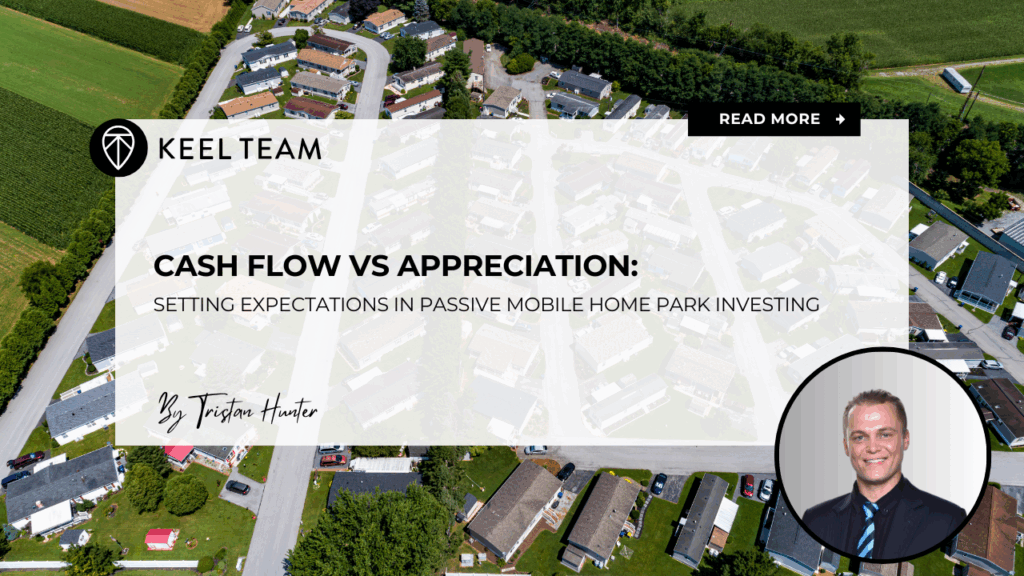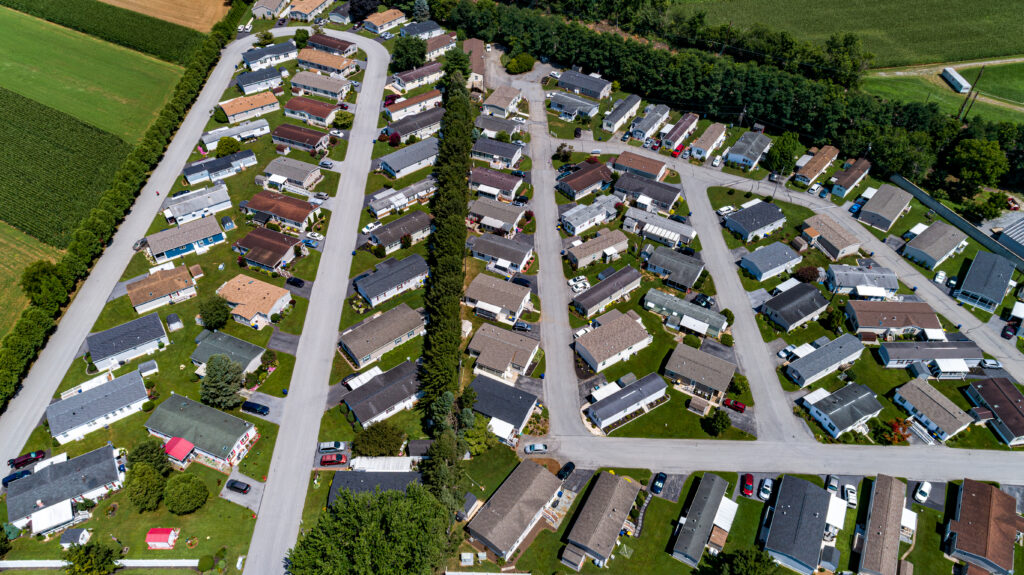Cash Flow vs. Appreciation: Setting Expectations in Passive Mobile Home Park Investing
-
 Tristan Hunter - Investor Relations
Tristan Hunter - Investor Relations

Passive mobile home park investing has gained attention in recent years as more investors seek stable income and exposure to affordable housing. Unlike traditional single-family rentals or apartment complexes, mobile home parks operate under unique financial dynamics that can provide both cash flow and appreciation potential.
However, it is important for investors to set realistic expectations. While some mobile home parks may lean heavily toward consistent income, others may offer long-term growth potential. Let’s explore how these two components—cash flow and appreciation—play out in passive mobile home park investing.
Understanding the Basics of Mobile Home Park Investing
Before diving into the balance of cash flow versus appreciation, it helps to understand how mobile home parks generate income.
- Lot Rent: In most cases, the primary income source is lot rent paid by residents who own their own homes but lease the land.
- Park-Owned Homes: Some mobile home parks may also generate income from homes they own and rent out, although many investors prefer tenant-owned models.
- Other Income: Miscellaneous revenue can come from storage fees, utility reimbursements, and late fees.
These revenue streams provide the foundation for both steady monthly distributions and long-term property value growth.
Download our FREE eBook on the Top 10 things to know BEFORE investing PASSIVELY in mobile home parks!
What Is Cash Flow in Mobile Home Park Investing?
Cash flow refers to the income investors may receive after expenses such as maintenance, taxes, insurance, and debt service are paid. For passive investors, cash flow often translates to quarterly or annual distributions from a syndication or fund.
Why Mobile Home Parks Are Known for Cash Flow
Mobile home parks are often considered income-driven investments. Because residents typically own their homes and only pay for lot rent, operating expenses can be lower compared to other forms of housing. This can leave more room for net operating income (NOI) to translate into potential cash flow.
Factors That Influence Cash Flow
Several factors can impact the level of cash flow investors may expect:
- Occupancy Rates: Higher occupancy generally leads to stronger cash flow.
- Operational Efficiency: Well-managed communities may reduce unnecessary costs and improve income.
- Rent Levels: Incremental lot rent increases, when responsibly implemented, can support higher cash flow.
- Financing Terms: Loan structures, such as interest-only periods, can influence available distributions.
What Is Appreciation in Mobile Home Park Investing?
Appreciation occurs when the value of a mobile home park increases over time. Unlike residential real estate, where values often follow comparable sales, commercial assets like mobile home parks are primarily valued based on net operating income.
How Appreciation Works in Mobile Home Parks
Since property values are tied to NOI, improvements in operations directly affect appreciation potential. For example, raising occupancy, implementing utility bill-backs, or responsibly adjusting rents can increase NOI, which may boost the value of the property if cap rates remain stable.
Market-Driven Appreciation
Appreciation can also come from broader market conditions, including:
- Demand for Affordable Housing: Increased demand may drive investor competition for mobile home parks.
- Cap Rate Compression: If capitalization rates decline in a market, property values may rise.
- Location Growth: Parks located in expanding metropolitan areas may experience more significant appreciation opportunities.
Cash Flow vs. Appreciation: Key Differences
Balancing cash flow and appreciation in mobile home park investing often comes down to investment goals and the specific deal structure.
| Factor | Cash Flow Focus | Appreciation Focus |
|---|---|---|
| Investor Goal | Steady income | Long-term growth |
| Timeline | Short to medium term | Long-term hold |
| Risk Profile | Typically lower | May involve more operational improvements |
| Typical Property Type | Stabilized communities with high occupancy | Value-add opportunities needing upgrades or better management |
Neither approach is inherently better—it depends on what an investor is seeking.
The Role of Passive Investors in Mobile Home Park Syndications
For those investing passively through syndications or funds, the balance of cash flow and appreciation often depends on the sponsor’s business plan.
Cash Flow-Driven Syndications
Some syndications focus on stabilized mobile home parks with strong current occupancy. These deals may prioritize distributing steady income to investors soon after acquisition.
Appreciation-Driven Syndications
Other syndications focus on value-add opportunities where occupancy may be lower or operational inefficiencies exist. In these cases, early distributions may be smaller, but long-term appreciation could be a key part of the strategy once improvements take effect.
Setting Realistic Expectations as a Passive Investor
Passive investors should align their expectations with the nature of the deal. While mobile home park investing has the potential to provide both income and growth, actual outcomes vary.
Questions to Ask Before Investing
- Does this opportunity focus more on stabilized cash flow or long-term appreciation?
- What is the business plan, and how will the sponsor execute it?
- What assumptions are being made about rent growth, occupancy, and cap rates?
- How conservative are the underwriting projections?
Asking these questions may help investors set realistic expectations and determine if a particular mobile home park investment matches their goals.

Balancing Cash Flow and Appreciation in a Portfolio
Many investors find value in holding both types of opportunities—some that lean toward cash flow and others that may offer stronger appreciation potential.
Common Diversification Benefits
By diversifying across different mobile home parks, markets, and business plans, investors may spread risk and balance their income needs with growth ambitions.
Example of a Balanced Approach
An investor might allocate capital into one stabilized mobile home park syndication designed for consistent distributions, while also placing capital into a value-add opportunity with potential for significant appreciation down the line.
This balance can provide the best of both worlds—steady income and long-term upside—though actual performance will vary deal by deal.
External Factors That Influence Both Cash Flow and Appreciation
Even with strong underwriting and management, external market conditions play a role in shaping outcomes.
- Interest Rates: Rising rates can increase financing costs, affecting both cash flow and valuations.
- Regulations: Local or state-level laws may impact rent increases or property operations.
- Economic Conditions: Job growth, population shifts, and broader economic health may influence demand for affordable housing.
- Supply Constraints: Limited development of new mobile home parks may continue to support both cash flow and appreciation potential.
Conclusion: Aligning Expectations With Strategy
Passive mobile home park investing offers a compelling combination of potential cash flow and appreciation, but no investment outcome is guaranteed. Investors who understand how each component works—and how to balance them—may be better positioned to select opportunities that match their personal financial goals.
Ultimately, the decision between prioritizing cash flow or appreciation comes down to investor preferences. Some may value consistent income, while others may focus on long-term growth. The best approach often involves diversification, careful due diligence, and working with experienced sponsors who communicate their strategy clearly.
By setting the right expectations and understanding the mechanics of mobile home park investing, passive investors can make informed decisions about where to place their capital.
Are you looking for MORE information? Book a 1-on-1 consultation with Andrew Keel to discuss:
- A mobile home park deal review
- Due diligence questions
- How to raise capital from investors
- Mistakes to avoid, and more!
Disclaimer:
The information provided is for informational purposes only and is not investment advice or a guarantee of any kind. We do not guarantee profitability. Make investment decisions based on your research and consult registered financial and legal professionals. We are not registered financial or legal professionals and do not provide personalized investment recommendations.

Tristan Hunter - Investor Relations
View The Previous or Next Post
Subscribe Below 👇





